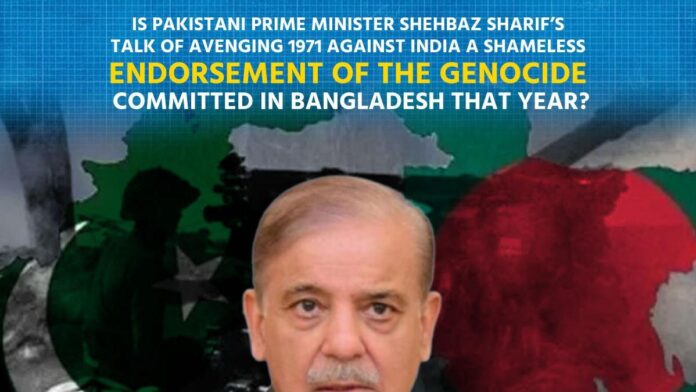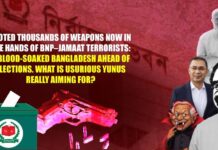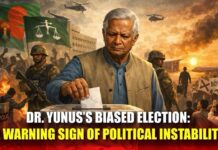
On Wednesday (May 14), while meeting soldiers who took part in Operation Bunyad-un-Marsous against India at the Pasrur military base in Sialkot, Shehbaz Sharif stated that Pakistan’s armed forces gave a swift and strong response to Indian aggression, avenging the 1971 war.
Through this statement, Shehbaz Sharif not only recalled the defeat of the Pakistani military in 1971 but also effectively offered an unrepentant endorsement of the brutal genocide carried out against unarmed Bengalis during that time.
Has Pakistan ever acknowledged the genocide in Bangladesh in 1971?
Citing the widespread killings and atrocities, Bangladesh has been observing March 25 as Genocide Day at the state level since 2017. On the night of March 25, 1971, the Pakistani invading forces launched a genocidal campaign—Operation Searchlight—to crush the identity of the Bengali nation and its desire for liberation.
“Pakistan has never acknowledged its responsibility for the genocide in Bangladesh. Not only that, its allies at the time, especially the United States, also managed to evade accountability. Although the genocide in Bangladesh is studied in several universities around the world as a case study, the issue hasn’t drawn adequate global attention.”
According to Elisa von Joeden-Forgey, Executive Director of the Lemkin Institute for Genocide Prevention, global recognition and accountability are essential to ending genocide and establishing lasting peace. Notably, the institute formally recognized the 1971 Bangladesh genocide in 2022.
On the night of March 25, 1971, the Pakistani army launched “Operation Searchlight” in Dhaka, killing approximately 50,000 civilians. Over the nine months of war, an estimated 3 million people were killed.
(“How Far is the Recognition of Genocide?”, Kalbela, March 25, 2025)
India’s role in training the Mukti Bahini:
India trained the Mukti Bahini during the 1971 Liberation War. Possibly fueled by this resentment, Shehbaz Sharif indirectly accused Indian Prime Minister Narendra Modi, saying:
“The world knows who trained the Mukti Bahini in 1971. The same forces are now supporting the Baloch Liberation Army and Tehrik-i-Taliban Pakistan. And this support is coming from Modi.”
Alim Haque, a resident of Bonn, Germany, who fought alongside Indian troops, said:
“Many Indian soldiers gave their lives in Bangladesh’s Liberation War. Their contribution is immense.”
After independence, Alim pursued higher education but eventually moved to Germany in the 1980s due to the economic instability and unrest in newly independent Bangladesh.
(“Indian soldiers’ contribution in the Liberation War is immense: Alim Haque,” Deutsche Welle, September 28, 2011)
India’s involvement was not limited to training the Mukti Bahini—its armed forces were also directly engaged in the war. Prime Minister Indira Gandhi played a crucial role in this effort, as reported by BBC Bangla.
“While the soldiers were preparing for war, Indira Gandhi was traveling the world doing her diplomatic homework,” said former Indian Army Chief General Shankar Roychowdhury.
“After the March crackdown, when refugees began flooding into India from East Pakistan, Indira Gandhi went from capital to capital urging world leaders to compel Pakistan to stop the atrocities. The influx of refugees was overwhelming India’s capacity.”
(“What was India’s military strategy in the Bangladesh Liberation War?” BBC Bangla, December 15, 2016)
Pakistani army’s ongoing brutality in Balochistan echoes 1971:
More than 20,000 people have disappeared in Balochistan, most of them nationalist political activists. The military is widely accused of being behind these disappearances. The Baloch middle class is said to be the primary target, with the aim of eradicating Baloch nationalism.
Sana Baloch disappeared from the outskirts of Kharan city on May 11. It has been three months since. But Sana’s case is not unusual—such disappearances are common in resource-rich Balochistan, where the military is accused of brutally suppressing autonomy movements. The military denies all such allegations.
(“Balochistan: The Middle-Class Youth Fighting for an Independent Homeland,” BBC, August 2, 2020)
Yunus’s pro-Pakistan stance despite their history of genocide:
Following a foreign secretary-level meeting, Bangladesh emphasized issues such as an apology for the atrocities during the Liberation War and pending dues from pre-independence joint resources. However, Pakistan made no mention of these unresolved matters.
(“Pakistan’s statement doesn’t mention Bangladesh’s demand for apology or compensation,” BBC Bangla, April 18, 2025)
Despite this, during the meeting—held after over 15 years—Bangladesh proposed cooperation in fisheries and marine technical training. Both countries expressed interest in resuming direct shipping between Chattogram and Karachi and reviving direct air travel routes.
Even though Pakistan sidestepped the issues of genocide recognition and compensation, Yunus and pro-Pakistan media highlighted these developments in a celebratory manner. Yunus’s pro-Pakistan attitude remains, even as Pakistani forces continue their brutal campaign of abduction and murder against unarmed independence-seeking civilians in Balochistan.
In January, Bangladeshi army generals visited Pakistan, and recently, the sudden leave and visit of Pakistani High Commissioner Maroof to Cox’s Bazar—where he met with Rohingyas—suggests an ominous anti-national conspiracy backed by Yunus.
References:
• We Have Taken Revenge for the 1971 War with India
• How Far is the Recognition of Genocide?
• Indian Soldiers’ Contribution in the Liberation War is Immense: Alim Haque
• What Was India’s Military Strategy in the Bangladesh Liberation War?
• Balochistan: The Middle-Class Youth Fighting for an Independent Homeland
• Bangladesh-Pakistan Drawing Closer Militarily




